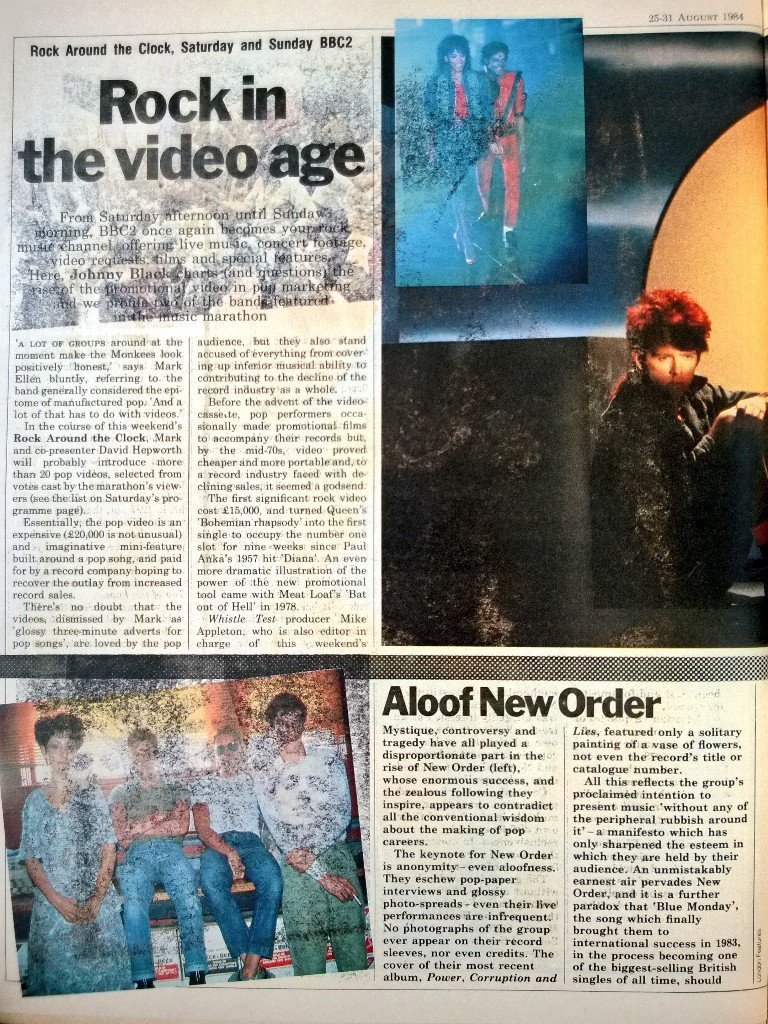1984 08 23 "Aloof" New Order, Radio Times
Aloof New Order
Mystique, controversy and tragedy have all played a disproportionate part in the rise of New Order (left), whose enormous success, and the zealous following they inspire, appears to contradict all the conventional wisdom about the making of pop careers.
The keynote for New Order is anonymity - even aloofness. They eschew pop-paper interviews and glossy photo-spreads - even their live performances are infrequent. No photographs of the group ever appear on their record sleeves, nor even credits. The cover of their most recent album, Power, Corruption and Lies, featured only a solitary painting of a vase of flowers, not even the record's title or catalogue number.
All this reflects the group’s proclaimed intention to present music 'without any of the peripheral rubbish around it’- a manifesto which has only sharpened the esteem in which they are held by their audience. An unmistakably earnest air pervades New Order, and it is a further paradox that 'Blue Monday’, the song which finally brought them to international success in 1983, in the process becoming one of the biggest-selling British singles of all time, should have been first and foremost a dance record.
As Joy Division - a quartet of Manchester grammar-school boys - the group made their first record in 1978, establishing a tone that was sombre and grandiose, personified in the melancholic singing and distracted and palpably unhappy demeanour of the vocalist, Ian Curtis.
In 1981 (sic), with Joy Division on the verge of major success, Curtis committed suicide.
The remainder of the group elected to carry on despite Curtis’s death, but under the new name of New Order.
The choice of two consecutive names with overtones of Nazism has caused controversy in itself. But Joy Division - the euphemism for prostitutes in Nazi concentration camps -was allegedly intended as an ironic allusion to the group’s own relationship with a rapacious record-industry, and New Order was claimed to be a 'neutral’ name.
Certainly ambiguities and speculation about the group multiply in the face of their own diffidence and reclusiveness. In concert too they convey a pungent fragrance of mystery.
The group invariably leave without taking a bow, or looking back, For the record, they are Peter Hook, Stephen Morris, Gillian Gilbert and Bernard Sumner. Although it can sometimes seem as if they’d just as soon you didn’t know.. . MICK BROWN


This article was new to me, so thanks for posting.
ReplyDeleteSadly, I don't know the source.
Searching the internet revealed that Mick Brown wrote for the broadsheets (Telegraph, Observer, Guardian etc.), so am guessing that this came from one of those publications, rather than the standard British music press.
Given that the article is in colour, I'm thinking it might have been from one of the glossy magazines that came with the above papers, i.e. on a Sunday.
The fact that it states that 'Power, Corruption and Lies' was a "recent album" and that 'Blue Monday' had become "one of the biggest-selling British singles of all time', it probably places this article around late 1983 (i.e. close enough to the 'PC&L' release date, but late enough for 'BM' to have generated significant sales.
Intriguing, isn't it?! Observer and Guardian are likeliest as I still read them now....
ReplyDeleteI've found the source for this!
ReplyDeleteWhilst looking for that Haçienda freebie in one of your later posts, I came across a scan that I had stored on my hard-drive for a few months. I thought it seemed familiar.
It's from the Radio Times, dated 23/08/84, in an article about the 'Rock Around The Clock' TV programme that was on that week.
I think I might have downloaded the scans from this post on Twitter:
https://twitter.com/woodg31/status/1298328686157017096
That's a great spot! Well done!
ReplyDelete